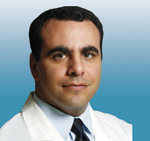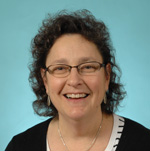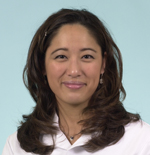Michael M. Awad, MD, Joan Rosenbaum, MD, and Gladys Tse, MD, have been chosen for the 2010-12 Carol B. and Jerome T. Loeb Teaching Fellowships at the School of Medicine.
The fellowship program was established in 2004 by a gift from the Loebs to advance clinical education and to honor local physicians committed to clinical excellence. Strengthened by a gift from the Barnes-Jewish Hospital Foundation, the program allows the fellows to take time from their regular duties to teach clinical medicine to students and residents. The two-year fellowships begin July 1.
Applicants for the fellowships are chosen for their record of excellence in patient care and clinical teaching. Their proposals must meet new or unmet clinical teaching needs for residents and/or students and include time spent in direct teaching and in program and curriculum development. In addition, applicants must show innovative teaching methods and a plan to continue the curriculum or project following completion of their Loeb Teaching Fellowship term. All proposals are reviewed by a selection committee appointed by Larry J. Shapiro, MD, executive vice chancellor for medical affairs and dean of the School of Medicine.
“The quality of these proposals shows the dedication and commitment our faculty has to provide our medical students and residents with unsurpassed education and training experiences,” Shapiro says. “We are grateful to the Loebs for this gift to meet clinical teaching needs at the School of Medicine.”
“The proposals by Michael, Joan and Gladys are timely and creative innovations in the education of medical students and residents,” says Alison Whelan, MD, senior associate dean for education and chair of the search committee. “Thanks to the Loebs’ generous gift, these fellowships offer a unique opportunity for a dedicated faculty member to really change how we teach and have a lasting impact on education and clinical care.”
Awad, assistant professor of surgery (minimally invasive surgery), was chosen for his proposal to continue the Web site work he began while a resident at Johns Hopkins Hospital. He will develop a Web-based portal for students and residents designed to integrate the medical curricula into an easily navigable resource. This site will include weekly competency-based curriculum orientation videos and text chapters, patient case logs, service work-list utilities, disease-specific online modules with assigned readings, pre-recorded lectures by faculty and reviews of relevant medical literature.

Awad will bring the site to the School of Medicine, integrate it into residency programs, develop a comprehensive curriculum management tool and build new features, including evaluations and a tool to help students and residents build a portfolio. The site is expected to benefit 1,100 residents and 500 medical students per year.
Rosenbaum, professor of pediatrics, plans to develop a curriculum in pediatric palliative care for medical students and residents. Palliative care is a comprehensive philosophy of care that focuses on the psychological, social and spiritual needs of patients with life-limiting illnesses and of their families.
The project will incorporate innovative teaching methods, including classroom instruction, clinical observation, simulation, parents as educators and an experiential component, and it would be available to third- and fourth-year medical students and pediatric residents.

Rosenbaum also will use classroom sessions and facilitated discussions on palliative and end-of-life care, grief and bereavement for third-year students during a pediatric rotation. In addition, she will create a fourth-year elective to include independent reading and discussion of literature, shadowing spiritual caregivers and role-play opportunities in the pediatric simulation laboratory.
The goal of the program is to develop a training program for medical students and pediatric residents in care that extends beyond science, technology and procedures.
Tse, assistant professor in obstetrics and gynecology, plans to implement a structured simulation program to acquire and evaluate basic and advanced surgical skills in obstetrics and gynecology. It also will include quantitative and qualitative measures of surgical competency. The simulation program will allow the trainees to see and think through emergencies before they enter real-life situations — saving lives and reducing complications.

In addition, Tse will develop a curriculum to enhance learning for third- and fourth-year medical students, which will allow them to get hands-on surgical experience in the simulation center prior to their operating room experience. The curriculum will include basic principles of surgery, minimally invasive techniques, laparoscopic hands-on training and management of intra-operative complications.